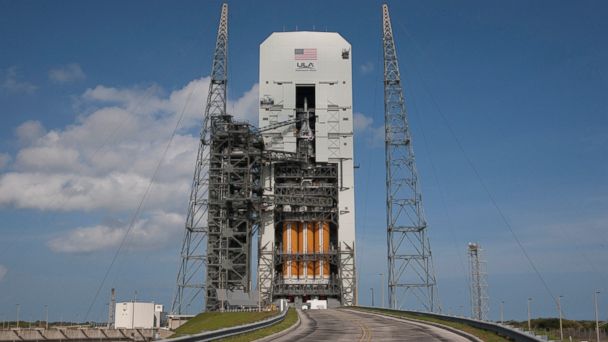NASA's Big Stakes With Orion Test Flight Include Mars Plans

The processing of Orion and its United Launch Alliance Delta IV Heavy rocket remains on course for a launch, Dec. 4, 2014, on the first flight test of the spacecraft design. NASA/Kim Shiflett.
NASA Administrator and former astronaut Charlie Bolden says there's a lot riding on tomorrow's $370 million test flight of the new space capsule known as Orion.
If all goes according to plan, the unmanned Orion capsule will launch Thursday morning atop a Delta IV Heavy rocket at Kennedy Space Center in Florida and make two loops around Earth over 4 ½ hours. The craft will test a variety of technologies for spaceflight beyond Earth orbit, including a heat shield that must protect future crews from a scorching re-entry at 20,000 mph.
But in an era of already tight budgets, any stumbles during tomorrow's launch and test flight could derail NASA's long-range hopes to land humans to the red planet.
"What's most important is that you perform. Tomorrow morning is a very critical mission for us," Bolden said today in an interview with ABC News. "We will have accomplished a major milestone of this program of sending humans, one of these days, to Mars."
Italian Astronaut Samantha Cristoforetti Spends Her First Day in Space
See the Space Station From Inside a Water Bubble
Getting to Mars is only part of the problem. Last month, NASA's inspector general said the space agency does not currently have the money to build the landing craft needed to actually fly people from Orion down to the Martian surface.
"Given the time and money necessary to develop landers and associated systems, it is unlikely that NASA would be able to conduct any manned surface exploration missions until the late 2030s at the earliest," the inspector general wrote.
Orion will eventually ride to orbit on the Space Launch System ( SLS), an expensive new launch vehicle that-without a specific mission-has led critics to dub it the "rocket to nowhere."
Congress originally mandated that SLS and Orion should fly by 2016. NASA says a test launch scheduled for December 2017 will slip to no later than November 2018, although Bolden refuses to rule out an earlier flight.
"There's always a chance," Bolden said. "We're scheduled to launch in 2018. Internally we have a date that's in 2017 and we always go for our internal date. So there's always a chance that we'll be better than we think we are."
NASA eventually hopes to use Orion and SLS to send astronauts to a captured asteroid, a mission that has been widely criticized by Congress and many scientists who believe it would pose an unacceptable cost and technical risk.
The NASA Advisory Panel, a group of outside experts that advises the space agency, said in an August letter to Bolden that NASA may be biting off more than it can chew.
"The mismatch between NASA's aspirations for human spaceflight and its budget for human spaceflight is the most serious problem facing the Agency," the panel wrote.